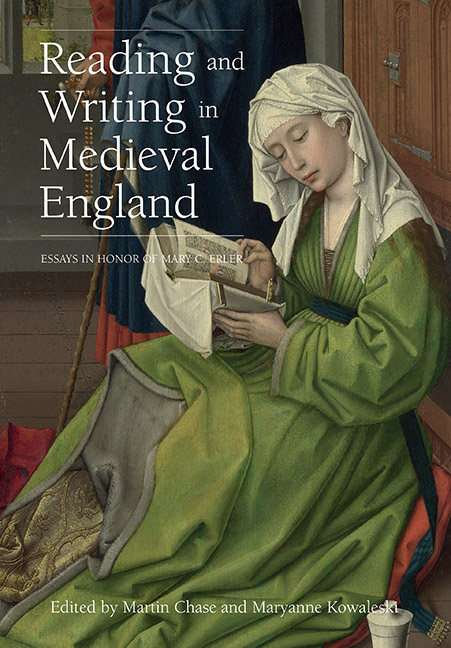Book contents
- Frontmatter
- Contents
- List of Illustrations
- List of Contributors
- List of Abbreviations
- Introduction: Bibliography in the Service of Biography
- “Withinne a Paved Parlour”: Criseyde and Domestic Reading in a City under Siege
- Beatrice Melreth: A London Gentlewoman and her Books
- How Intellectual Were Fifteenth-Century Londoners? Grammar versus Logic in the Citizens’ Encounters with Learned Men
- Social Memory, Literacy, and Piety in Fifteenth-Century Proofs of Age
- Crafting the Old Testament in the Queen Mary Psalter
- Affective Reading and Walter Hilton's Scale of Perfection at Syon
- Book Accessories, Gender, and the Staging of Reading
- Enska Vísan: Sir Orfeo in Iceland?
- Reading the Real Housewives of John Foxe's Book of Martyrs
- The Writings of Mary Carpenter Erler
- Index
- Tabula Gratulatoria
“Withinne a Paved Parlour”: Criseyde and Domestic Reading in a City under Siege
Published online by Cambridge University Press: 21 June 2019
- Frontmatter
- Contents
- List of Illustrations
- List of Contributors
- List of Abbreviations
- Introduction: Bibliography in the Service of Biography
- “Withinne a Paved Parlour”: Criseyde and Domestic Reading in a City under Siege
- Beatrice Melreth: A London Gentlewoman and her Books
- How Intellectual Were Fifteenth-Century Londoners? Grammar versus Logic in the Citizens’ Encounters with Learned Men
- Social Memory, Literacy, and Piety in Fifteenth-Century Proofs of Age
- Crafting the Old Testament in the Queen Mary Psalter
- Affective Reading and Walter Hilton's Scale of Perfection at Syon
- Book Accessories, Gender, and the Staging of Reading
- Enska Vísan: Sir Orfeo in Iceland?
- Reading the Real Housewives of John Foxe's Book of Martyrs
- The Writings of Mary Carpenter Erler
- Index
- Tabula Gratulatoria
Summary
When Boccaccio's Pandaro makes his first visit to Criseida as go-between for Troiolo, the text says only that “he made his way to where Criseida abode. And she, seeing him coming to her, stood up and greeted him from afar, and Pandarus her. And, taking her by the hand, he led her with him into an apartment” (sen gì ver dove Criseida stava; / la qual, veggendo lui a sé venire, / levata in pie, di lungi il salutava, / e Pandar lei, cui per la man pigliata / in una loggia seco l'ha menata). There the two of them talk and joke, until Pandaro gradually reveals that Troiolo is in love with her. After much discussion, Criseida agrees to accept Troiolo's love.
When Chaucer's Pandarus makes his first visit to Criseyde as go-between for Troilus, he asks some of “hire folk” where she is, and is directed to her “paved parlour,” where she and two of her ladies are sitting, listening to a maiden read aloud to them. Pandarus and Criseyde do an elaborate little dance around the book, both verbally and spatially, until they fall into a conversation that starts with Criseyde asking for news of the siege and then is guided by Pandarus into mutual praise of Troilus’ successes in defending Troy. Next Criseyde wants to consult Pandarus concerning her estates; her people draw away as the two sit down together, and Pandarus turns the conversation back to his friend. After much discussion, Criseyde agrees merely to be nice to Troilus – to “maken him good chere.”
Given her social standing, Boccaccio's Criseida would have had a household of attendants and servants around her, just like her English counterpart, but it was Chaucer's choice to make these “folk” visible, as a mini-throng through whom Pandarus must navigate in order to get Criseyde alone. Chaucer also invented the reading in the paved parlor, and in doing so, not only complicated Pandarus’ task of proxy seduction but also inaugurated a complex exploration of the nature of reading, of women, and of women reading.
- Type
- Chapter
- Information
- Reading and Writing in Medieval EnglandEssays in Honor of Mary C. Erler, pp. 9 - 38Publisher: Boydell & BrewerPrint publication year: 2019



